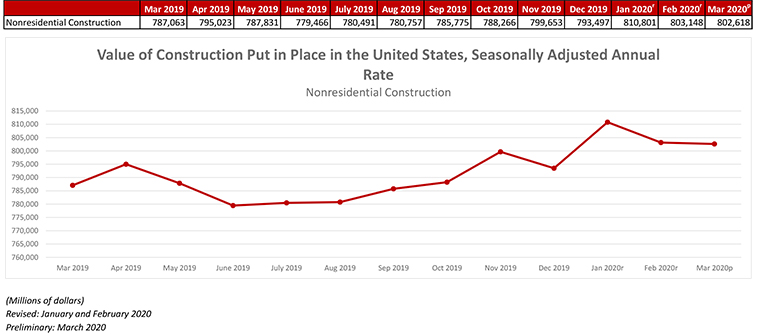
Key Takeaways
- Nonresidential construction spending, which totaled $802.6 billion on a seasonally adjusted annual basis in March, fell 0.1% and is up 2.0% compared to the same time last year.
- Private nonresidential spending fell 1.3% from February, while public nonresidential construction spending increased 1.6%.Thank you for brigt
Press Release from Associated Builders and Contractors, Inc.
WASHINGTON, May 1—National nonresidential construction spending fell 0.1% in March and is up 2.0% compared to the same time last year, according to an Associated Builders and Contractors analysis of data published today by the U.S. Census Bureau. On a seasonally adjusted annualized basis, spending totaled $802.6 billion for the month.
Among 16 nonresidential subcategories, 12 experienced a decline in spending on a monthly basis. Private nonresidential spending fell 1.3% from February, while public nonresidential construction spending increased 1.6%.
“Today’s data release answers precious few questions,” said ABC Chief Economist Anirban Basu. “The great debate has been whether the combination of pre-existing backlog as reported in ABC’s Construction Backlog Indicator and the classification of construction as an essential activity in much of the nation would help shield the sector from the downturn. Based on March construction spending data, industry activity largely proceeded apace, with recessionary forces impeding broader industry activity to only a limited extent.
“However, the data are inconclusive,” said Basu. “Economically, the pandemic impacted only a portion of March. Moreover, March represented only the tip of the iceberg in terms of the economic impact of COVID-19, as April was far worse. Many general contractors are in the midst of discussions with developers and other consumers of construction services regarding potential project postponements and cancellations. While the health of public finances held up in March, they collapsed in April as governors, mayors, county executives and others began to observe large gaps in budgets. According to ABC’s Construction Confidence Index, confidence in sales, profit margins and staffing levels plummeted in late March. This strongly implies that pre-existing backlog may not be as potent a defensive mechanism as it typically is during the early stages of an economic downturn.
“Furthermore, there have been anecdotal reports of construction projects shutting down temporarily due to lingering concerns about the need for aggressive social distancing and associated worker availability challenges,” said Basu. “All of this suggests that the March spending data may be supplying a false sense of industry-wide stability. Data characterizing construction spending in April and May will be far more instructive.”
Press Release from Associated General Contractors of America
Nonresidential Construction Spending Declines In March As Pandemic Halts Projects; Group Warns Loan Threats Are Hurting Relief Program
Treasury Department’s Recent Changes to Paycheck Protection Program Loan Guidance Are Making It Even Harder for Firms to Maintain Jobs Amid Declining Private-Sector Demand for Construction
Numerous impediments to completing construction projects led to declines in most categories of private construction spending in March, according to an analysis by the Associated General Contractors of America of government data released today. Association officials warn that the Treasury Department’s threats to audit or prosecute some Paycheck Protection Program loan recipients and deny loan recipients tax deductions are making it harder for construction firms already coping with declining private-sector demand to retain staff.
“Unfortunately, these numbers are only the beginning of what seems sure to be a steep decline in construction spending as current projects finish and new work is canceled or postponed indefinitely,” said Ken Simonson, the association’s chief economist. “Our latest survey found that projects as far out as June or later were being canceled last month.”
The economist noted that 10 out of 11 private nonresidential construction categories in the Census Bureau’s monthly construction spending release declined from February to March. The only exception—communication construction—probably reflected increased demand for structures to accommodate the jump in video conferencing for business, educational and personal use, Simonson added.
“In addition to the downturn in private construction, public categories were mixed,” Simonson said. “For instance, highway and street construction spending increased by 4.6 percent, which probably reflected favorable weather and the ability of highway contractors to work longer hours on nearly-deserted roads. But other major public segments, including educational construction and transportation structures such as transit projects, declined. Further declines in public construction are likely as state and local governments struggle to balance their budgets in the face of unbudgeted expenses and steep, unanticipated revenue decreases.”
Association officials said that several recent announcements by the Treasury Department are causing significant confusion about, and potentially undermining, the Paycheck Protection Program loans. They noted that recent threats by the Treasury Department to audit, or possibly even prosecute, firms that qualified for the loans was causing many firms to reconsider using the funds to protect payrolls. They added that a new IRS decision to deny tax deductions for wages and business expenses to loan recipients was also counterproductive.
“The fact that the Treasury Department continues to move the goal posts on its Paycheck Protection Program guidance is hurting construction firms that are already coping with declining private-sector demand and the prospects of significantly reduced state and local funding,” said Stephen E. Sandherr, the association’s chief executive officer. “Without further clarification from the Treasury Department, some employers may just decide it is better to return their loans and cut staff than run the risk of audit and investigation.”













